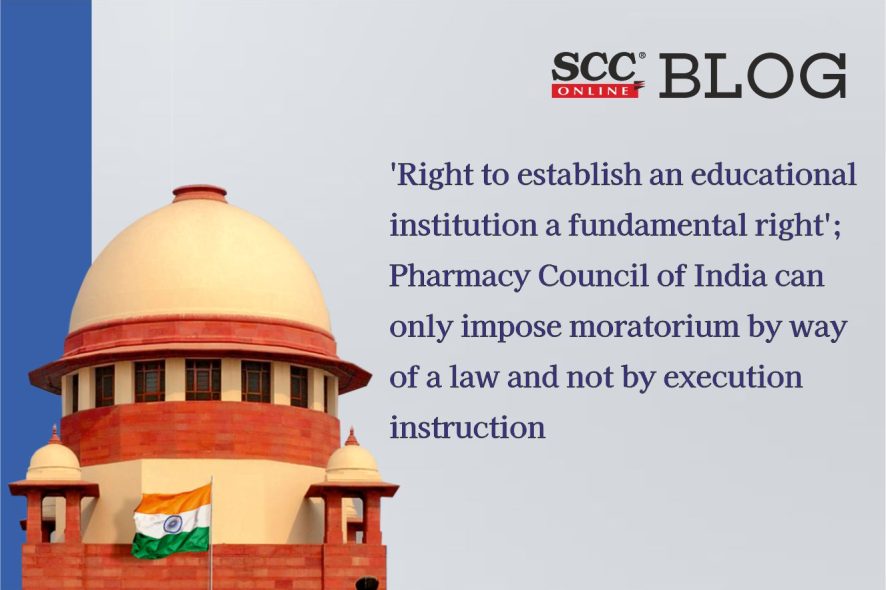Supreme Court: The bench of BR Gavai* and PS Narasimha, JJ has held that the right to establish an educational institution is a fundamental right under Article 19(1)(g) of the Constitution of India and reasonable restrictions on such a right can be imposed only by a law and not by an execution instruction.
What was under challenge?
The ruling came in a case where the Court was called upon to decide whether the moratorium, as imposed by the Pharmacy Council of India (PCI), could have been imposed by resolution/communications dated 17.07.2019 and 09.09.2019, which is in the nature of an executive instruction of the Central Council.
Resolution/Communication dated 17.07.2019: A moratorium on the opening of new pharmacy colleges for running Diploma as well as Degree courses in pharmacy for a period of five years beginning from the Academic Year 2020-2021.
Resolution/communication dated 09.09.2019:
- Modified the aforesaid moratorium, thereby exempting its application to
(i) Government Institutions;
(ii) Institutions in North Eastern region; and
(iii) States/Union Territories where the number of institutions offering D. Pharm and B. Pharm courses (both combined) is less than 50.
- The institutions which had applied for opening colleges offering D. Pharm and/or B. Pharm courses for 2019-2020 academic session were allowed to apply for conducting diploma as well as degree courses in Academic Session 2020-2021 and existing approved pharmacy institutions were allowed to increase the intake capacity as per PCI norms and/or to start additional pharmacy course(s).
The 4 High Court judgments in question
The Karnataka High Court[1]; Delhi High Court[2] and Chhattisgarh High Court[3], while allowing the writ petitions filed by the respondent-institutions and quashing and setting aside the Resolutions/communications of PCI’s Central Council, in a nutshell, held:
(i) That the right to establish educational institutions is a fundamental right guaranteed under Article 19(1) (g) of the Constitution of India;
(ii) That there can be reasonable restrictions on such a right. However, such a restriction can be imposed only by law enacted by the competent legislature;
(iii) Resolution/Communication dated 17.07.2019, vide which the moratorium was imposed is an executive instruction and could not be construed as a law and, therefore, the moratorium imposed by an executive instruction is not sustainable in law.
Bombay High Court[4], on the other hand, upheld the moratorium. It was argued before the Court that said judgment of the Bombay High Court has not been considered by all the three High Courts of Karnataka, Delhi and Chhattisgarh.
Supreme Court’s Analysis and Verdict
Holding that the right to establish an educational institution is a fundamental right under Article 19(1)(g) of the Constitution of India and reasonable restrictions on such a right can be imposed only by a law and not by an execution instruction, the Court held that the Bombay High Court, did not lay down the correct position of law and that the view taken by the High Courts of Karnataka, Delhi and Chhattisgarh laid down the correct position of law.
Deciding against PCI, the Court held that PCI could not impose restrictions on the fundamental right to establish educational institutions under Article 19(1)(g) of the Constitution of India. Hence, the Resolutions/communications dated 17th July 2019 and 9th September 2019 of the Central Council of PCI have been struck down.
On Necessity to impose restrictions
There could indeed be a necessity to impose certain restrictions so as to prevent mushrooming growth of pharmacy colleges. Such restrictions may be in the larger general public interest. However, if that has to be done, it has to be done strictly in accordance with law. If and when such restrictions are imposed by an Authority competent to do so, the validity of the same can always be scrutinized on the touchstone of law.
On requirement of “No Objection Certificate”
The applications seeking approval for D. Pharm and B. Pharm courses are required to be accompanied by a “No Objection Certificate” (“NOC”) from the State Government and consent of affiliation from the affiliating bodies. While scrutinizing such applications, the Council can always take into consideration various factors before deciding to allow or reject such applications. Merely because an institution has a right to establish an educational institution does not mean that such an application has to be allowed. In a particular area, if there are more than sufficient number of institutions already existing, the Central Council can always take into consideration as to whether it is necessary or not to increase the number of institutions in such an area. However, a blanket prohibition on the establishment of pharmacy colleges cannot be imposed by an executive resolution.
[Pharmacy Council of India v. Rajeev Pharmacy College, CIVIL APPEAL NO. 6681 OF 2022, decided on 15.09.2022]
*Judgment by: Justice BR Gavai
For PCI: Senior Advocate Maninder Singh
For Respondents: Senior Advocates Rakesh Dwivedi and Vinay Navare, Advocates Amit Pai, Sanjay Sharawat, Siddharth R. Gupta, and Shivam Singh
[1] Writ Appeal No. 746748 of 2020, dated 09.11.2021
[2] Writ Petition (Civil) No.175 of 2021, dated 07.03.2020






